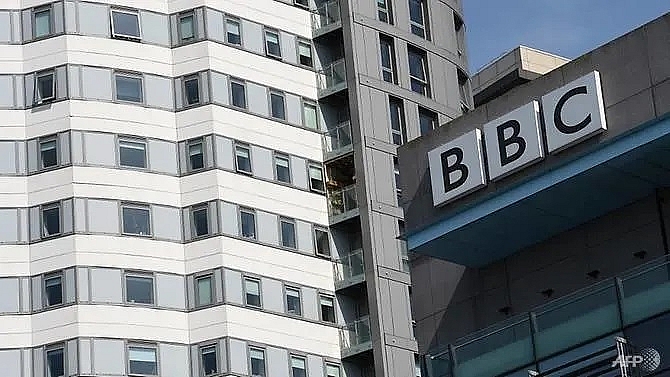Britain's BBC to axe 450 newsroom jobs in cost-cutting drive
 |
| A picture shows a general view of the BBC Studios at the MediaCityUK complex in Salford, Greater Manchester, northwest England, on May 14, 2019. (Photo: AFP/Paul Ellis) |
The corporation said it would reorganise its newsroom along a "story-led" model where staff will be assigned to stories and not attached to individual programmes.
"We need to reshape BBC News for the next decade in a way which saves substantial amounts of money," said Fran Unsworth, director of news and current affairs.
"We are spending too much of our resources on traditional linear broadcasting and not enough on digital."
The Victoria Derbyshire morning show will be axed, with other job losses coming from a reduction in the number of films produced by flagship news programme Newsnight.
Other jobs will be lost at radio station 5 Live, and there will be a review of the number of presenters working for the broadcaster.
It noted that audiences for traditional television broadcasts continued to decline, especially among 16- to 34-year-olds.
"The BBC newsroom will be reorganised along a 'story-led' model, focusing on news stories more than on programmes or platforms," said the statement.
"This is designed to reduce duplication and to ensure that BBC journalism is making as much impact as possible with a variety of audiences."
BBC News reported that it currently employs about 6,000 people, including 1,700 outside the UK. Its budget after the changes will be around £480 million per year.
The corporation had announced in 2016 that it needed to save £800 million, with around £80 million of that figure coming from the news division.
The 450 job cuts include around 50 post closures at the World Service that were announced at the end of 2019.
Embattled BBC boss Tony Hall announced last week he would step down in six months' time, as the corporation grapples with a damaging equal-pay ruling and questions over its funding model as new ways emerge to consume news and entertainment.
Hall, 68, who will depart after seven years at the helm, said the BBC needed new leadership ahead of negotiations with the government in the middle of the decade over its future funding and status.
Unsworth insisted that "Auntie", as it is informally known in Britain, had "a vital role to play locally, nationally and internationally".
"In fact, we are fundamental to contributing to a healthy democracy in the UK and around the world," she added.
"If we adapt we can continue to be the most important news organisation in the world."
What the stars mean:
★ Poor ★ ★ Promising ★★★ Good ★★★★ Very good ★★★★★ Exceptional
Related Contents
Latest News
More News
- Foreign leaders extend congratulations to Party General Secretary To Lam (January 25, 2026 | 10:01)
- Russian President congratulates Vietnamese Party leader during phone talks (January 25, 2026 | 09:58)
- Worldwide congratulations underscore confidence in Vietnam’s 14th Party Congress (January 23, 2026 | 09:02)
- Political parties, organisations, int’l friends send congratulations to 14th National Party Congress (January 22, 2026 | 09:33)
- 14th National Party Congress: Japanese media highlight Vietnam’s growth targets (January 21, 2026 | 09:46)
- 14th National Party Congress: Driving force for Vietnam to continue renewal, innovation, breakthroughs (January 21, 2026 | 09:42)
- Vietnam remains spiritual support for progressive forces: Colombian party leader (January 21, 2026 | 08:00)
- Int'l media provides large coverage of 14th National Party Congress's first working day (January 20, 2026 | 09:09)
- Vietnamese firms win top honours at ASEAN Digital Awards (January 16, 2026 | 16:45)
- ASEAN Digital Ministers' Meeting opens in Hanoi (January 15, 2026 | 15:33)

 Tag:
Tag:















 Mobile Version
Mobile Version